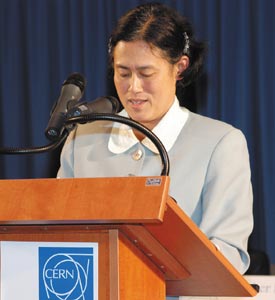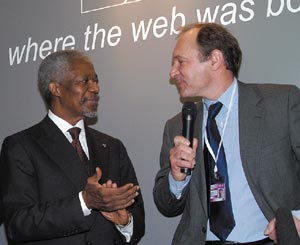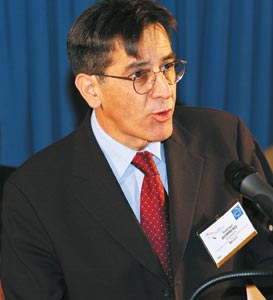
Scientists, policy makers and stakeholders from around the world came together at CERN on 8 and 9 December 2003, when the laboratory hosted The Role of Science in the Information Society (RSIS) conference. Organized by CERN in collaboration with UNESCO, the International Council for Scientific Unions and the Third World Academy of Science, the conference took place immediately prior to the World Summit on the Information Society (WSIS), held in Geneva on 10-12 December.

The conference was organized on the premise that science has a key role to play in broadening the information society.
Basic science made the technologies that underlie the information society possible, and the needs of the scientific community have often driven new developments in information and communication technologies (ICTs), such as the Internet and the World Wide Web. As Ismail Serageldin, director-general of the Library of Alexandria, Egypt, told the conference: “Today, when we stand at the threshold of the new ICT revolution and can barely see the contours of the new organization of knowledge, we must be willing to re-invent ourselves and to think of radical change, not just incremental change.”

During the first half-day of the conference, plenary speakers gave their perspectives on the past, present and future of science, ICTs, and society. The following morning, attendees divided into parallel sessions where they explored five areas in more depth: enabling technologies, economic development, health, environment and education. The plenaries then reconvened in the afternoon, when participants heard the results of the parallel sessions, a visionary panel and closing remarks.
Among the key plenary speakers were Princess Maha Chakri Sirindhorn of Thailand, who reminded the conference that there is no single formula for development; Tim Berners-Lee, director of the World Wide Web Consortium (W3C), who articulated the vision that led him to create the World Wide Web while working at CERN; Ismail Sarageldin, who described in particular the “hole in the wall” project for bringing the Web to slum children; and Lidia Brito from Mozambique, who emphasized the importance of fair trade in knowledge. Koichiro Matsuura, the director-general of UNESCO, and Yoshio Utsumi, the secretary-general of the International Telecommunication Union, also addressed the conference.
Several general themes emerged and received clear support at RSIS:
• that fundamental scientific information be made freely available;
• that the software tools for the dissemination of this information be also made freely available;
• that networking infrastructure for distributing this information be established worldwide;
• that training of people and equipment to use this information be provided in the host nations;
• and that general education underpins all these goals and is an indispensable basis for the information society.
“This event has helped to develop a vision for how information and communication technologies can be applied for the greater benefit of all,” said Luciano Maiani, director-general of CERN, in his summary of the conference. Immediately following RSIS, Maiani made a statement at WSIS on behalf of the participants. He was instructed by RSIS to urge the heads of state gathered at WSIS to endorse fully the guidelines that emerged from the RSIS discussions.
CERN also held a Science and the Information Society Forum at the “ICT for Development” platform in Geneva’s Palexpo Centre, which was open to the public during the world summit. The forum served as a venue for scientific organizations to exhibit their ICT-related initiatives. Also on display was the first Web server and information about CERN and the RSIS conference. Using the server, United Nations secretary-general Kofi Annan and Tim Berners-Lee sent a message to 800 schools around the world.








